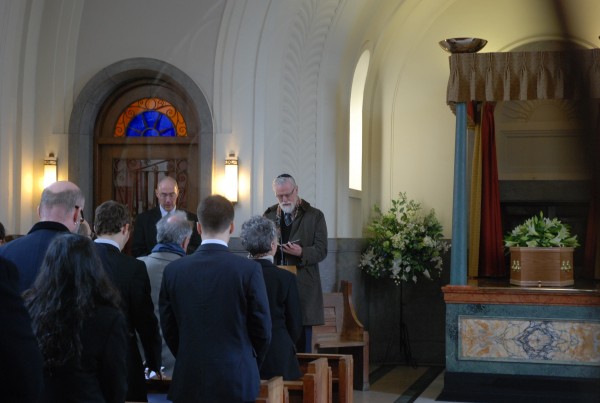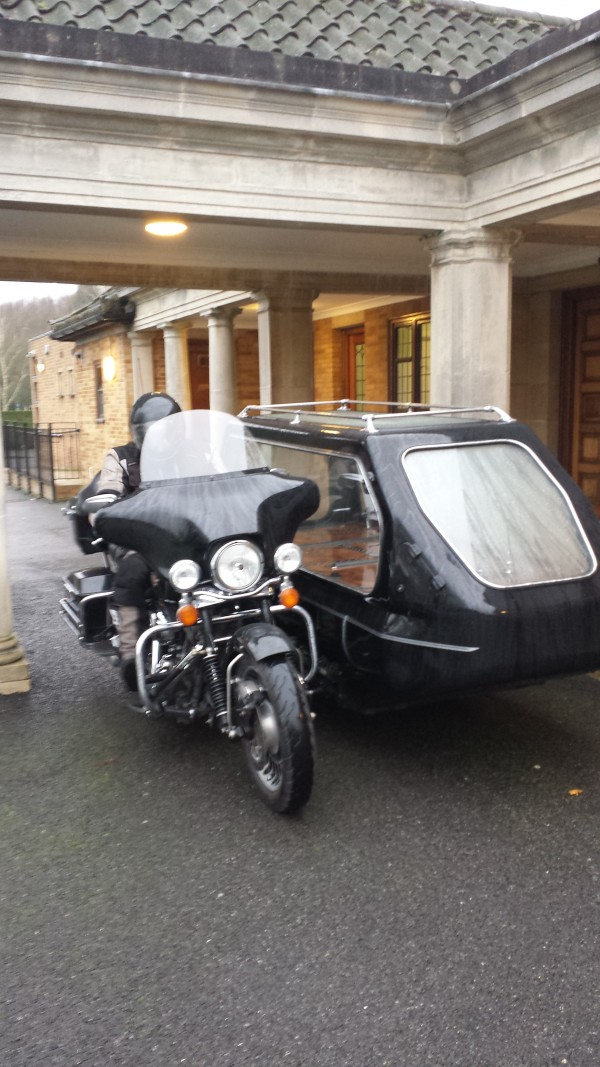
by Michael | Jan 4, 2016 | Blog
When you think about it, wedding speeches and eulogies have much in common. They do have to be well-written and well-delivered, and neither of those areas tend to be many people’s strengths. Moreover, grief can make the process even harder.
So here is some guidance to steer you to safety.
A quick and easy solution is to ask your celebrant to draw up a eulogy for you. You’ll have to supply the information and probably check and approve the draft , but that’s a good method – especially if you dread public speaking – and you may well be at your lowest ebb anyway at such a time.
Another possibility is to get a friend or relative, or even several, to deliver tributes. Nobody should be forced into this, but, if they agree, they should be warned to keep the tribute reasonably short (1-2 minutes each, tops), to the point (rambling interminably spoils the moment) and well-delivered (slow and clear).
For anybody planning to do their own speech writing, I hope the following hints will help.
Think about your audience
- Be aware of the fact that there may be issues that would be better left unsaid (family animosities, for example)
- You may well feel mournful, but you can also focus on the uplifting and inspiring. Many people prefer a celebration of life, and a joke need not be seen as inappropriate, although we’re not talking about comedy routines!
- People will want to hear nice things about the deceased, but everybody is human. It may be fine to mention one or two idiosyncrasies about the deceased. However, saying somebody was “a bit difficult at times” or “they could be obstinate on occasion” gets the message across in a better way than saying “he/she was a complete b***”!
A couple of minutes (2-4) is probably enough.
The person
In most cases, you will want to cover the main biographical parts of the deceased’s life (people will be there who know only one side of that life, probably). However, an account like that risks being quite dry. A few well-chosen stories can really (no pun intended) bring the deceased to life.
So aim at covering the qualities of the person, and also something encompassing happy, funny, unusual, even sad events that sum up their life.
The script
It’s worth writing a full script (experienced and confident speakers may get by with notes, and a few can talk fluently impromptu, but I don’t advise this in the majority of cases). You should practise reading it, preferably to someone you know quite well, who can tell you if your words are coming across as you mean.
Start, middle and end
You can leave the beginning till you have written the other parts, but when you do, it’s probably best to start by going straight for the point. It might just be to thank the guests for their support.
You can end with something short by way of conclusion (possibly a phrase addressed directly to the deceased).
Delivery
- Practise reading your eulogy beforehand.
- Stand when giving the eulogy.
- Come dressed appropriately.
- Try and stand still when speaking, and appear as calm as you can.
- Look up periodically at your audience (so they feel involved). Mark your place with a finger as you look away!
- Speak slowly. (You’re bound to be nervous, and we often accelerate under those circumstances.) You project better that way – and also you (and your audience) will have time to think about what you are saying.
Nobody will blame you if you are overcome with emotion. It’s perfectly natural. Give yourself a couple of moments before carrying on. (If you really can’t, and you have a script, then your celebrant can take over.)
To sum up, you don’t have to have a eulogy at all. If you do want one, involve the celebrant, by all means. Alternatively, you can invite people close to the deceased. But if you do it yourself, I hope the advice I offer will be helpful to you.
by Michael | Aug 19, 2015 | Blog
Most people are familiar with the line that we have two ears but only one mouth because we ought to be listening twice as much as we speak.
Well, you might wonder how that applies in my job, as the popular image of a civil celebrant is that person standing up at the front, conducting the ceremony – be it a wedding, funeral, handfasting, blessing, naming or whatever – and jabbering away. In other words, I do the speaking and you (have to) do the listening!
However, there is another part of the proceedings that you probably wouldn’t think about, and that is when the ears/mouth equation comes into its own for me. That is during my planning meeting with the client.
After the initial contact, I almost always visit the next-of-kin, if it’s a funeral, or, if it’s a celebration, arrange a face-to-face or Skype meeting with the couple. As well as being an opportunity to see if we’re both OK to work together, this is a chance for the client to ask questions in an unintimidating atmosphere. For me, it is also an opportunity to ask questions and also to suggest ideas. (Yes, that does involve more talking!)
However, in reality, most of this conversation for me will be spent listening (although there is the occasional case – usually caused by shock after a death – when the client will say next to nothing, and I have to work at gaining their trust). I need to pay close attention, as I often have to pick up clues about what the client wants, as they may not really have much of a conscious idea themselves.
If the client does know exactly what they are looking for, my role is to take note so I can mould it in the best possible, most effective, way. I may question an element or two (“do you realise that …?”), but it’s not my job to change anything (provided everything’s legal, etc.).
I respect their wishes – they can have a mixture of religious elements (or none, if they choose) – and I try to accommodate any preferences they may have for readings, music and participants.
If they don’t know what they want, then I ask questions to get a sense for the sort of thing they may like and provide suggestions for possible rituals to fit the bill. When I finish, I try and put this all together to construct a meaningful and memorable ceremony that meets the needs – and beliefs – of the client. So maybe I do still sometimes talk a bit more than I listen, but I hope I’m getting the balance right.
Another way I’d love to put “two ears, one mouth” into practice is to respond to any requests you may have for subjects for me to deal with in my blogs. To quote my hero, Frasier Crane, “I’m listening!”

by Michael | Dec 9, 2014 | Blog
Continuing the jolly theme I started last week of dealing with funerals, I promised to discuss eulogies, and I will not let you down!
Of course, there is nothing wrong with asking your celebrant to draw up a eulogy for you. You’ll have to supply the information and probably check and approve the draft , but that’s a good solution – especially if you dread public speaking – and you may well be at your lowest ebb anyway at such a time.
Another possibility is to get a friend or relative, or even several, to deliver tributes. Nobody should be forced into this, but, if they agree, they should be warned to keep the tribute reasonably short (1-2 minutes each, tops), to the point (rambling interminably spoils the moment) and well-delivered (slow and clear).
For anybody planning to do their own speech writing, I hope the following hints will help.
Think about your audience
- Be aware of the fact that there may be issues that would be better left unsaid (family animosities, for example)
- You may well feel mournful, but you can also focus on the uplifting and inspiring. Many people prefer a celebration of life, and a joke need not be seen as inappropriate, although we’re not talking about comedy routines!
- People will want to hear nice things about the deceased, but everybody is human. It may be fine to mention one or two idiosyncrasies about the deceased. However, saying somebody was “a bit difficult at times” or “they could be obstinate on occasion” gets the message across in a better way than saying “he/she was a complete b***”!
A couple of minutes (2-4) is probably enough.
The person
In most cases, you will want to cover the main biographical parts of the deceased’s life (people will be there who know only one side of that life, probably). However, an account like that risks being quite dry. A few well-chosen stories can really (no pun intended) bring the deceased to life.
So aim at covering the qualities of the person, and also something encompassing happy, funny, unusual, even sad events that sum up their life.
The script
It’s worth writing a full script (experienced and confident speakers may get by with notes, and a few can talk fluently impromptu, but I don’t advise this in the majority of cases). You should practise reading it, preferably to someone you know quite well, who can tell you if your words are coming across as you mean.
Start, middle and end
You can leave the beginning till you have written the other parts, but when you do, it’s probably best to start by going straight for the point. It might just be to thank the guests for their support.
You can end with something short by way of conclusion (possibly a phrase addressed directly to the deceased).
Source: northvancouverfuneral.com
Delivery
- Practise reading your eulogy beforehand.
- Stand when giving the eulogy.
- Come dressed appropriately.
- Try and stand still when speaking, and appear as calm as you can.
- Look up periodically at your audience (so they feel involved). Mark your place with a finger as you look away!
- Speak slowly. (You’re bound to be nervous, and we often accelerate under those circumstances.) You project better that way – and also you (and your audience) will have time to think about what you are saying.
Nobody will blame you if you are overcome with emotion. It’s perfectly natural. Give yourself a couple of moments before carrying on. (If you really can’t, and you have a script, then your celebrant can take over.)
To sum up, you don’t have to have a eulogy at all. If you do want one, involve the celebrant, by all means. Alternatively, you can invite people close to the deceased. But if you do it yourself, I hope the advice I offer will be helpful to you.
Michael Gordon can help prepare and conduct a tailor-made civil ceremony in or around London or, indeed, in Europe.

by Michael | Dec 2, 2014 | Blog
Let’s be brutally frank: it’s funeral season.
I don’t have any celebration ceremony bookings at present until early Spring, but currently there is no shortage of requests for me to create and conduct funerals. This may well increase as the weather (presumably) worsens.
So, rather than give guidance, as I usually do, about weddings and vow renewals, etc., I thought I’d offer some musings about less happy events. And, let’s face it, we’re all going to die some time ..
Death
If someone dies at home (or in a nursing home), a doctor must be called to issue the Medical Certificate of Death. This will be done by hospital staff, if the deceased dies while in hospital.
Assuming there is no need for a post-mortem, etc., the next step, before arranging the funeral, is to make an appointment to see the Registrar.
Registering the Death
There are lots of choices how to commemorate a death, but, come what may, it has to be recorded legally. So the registrar will need to be informed, and will want:
- details of the death (including the Death Certificate)
- name, address, date and place of birth of the deceased
- their occupation
- whether they were receiving a pension or allowance from public funds
- if married, the date of birth of the surviving spouse.
The funeral
The Procession
Historically, a cortege was much favoured, and today you can still see horse-drawn hearses. Most commonly, though, it will be a limousine – although you can actually come across a range of creative ideas for the procession (eg motorcycle hearses, or bringing the coffin by a lorry, say, to reflect the deceased’s profession or passion).

Burial
There are a number of interesting customs still in use – mostly in Wales, Scotland and Northern Ireland, where burial tends to happen sooner. Some regional traditions include the use of cords to lower the coffin (Scotland), families in Wales announce a death by pinning cards to lamp posts and there are the ‘lifts’ (Northern Ireland), where the coffin is passed from hand to hand. In England, rosemary may be placed on the coffin or at the graveside (symbolising remembrance).
It is traditional to strew soil or rose petals over the coffin, but nowadays there are new rituals, which may include live music, fireworks, release of doves, bubbles or balloons.

Cremation
Ashes can be buried, scattered or kept, so it is as well to consider these options carefully. There are various regulations about scattering or burying ashes, and a Funeral Director should be able to advise you.
The service
Music still plays a big part at a funeral, but religious music is in decline. People prefer songs associated with the deceased (or chosen by them). An organ is often an option, but usually the chapel may have a Wesley System (which can access most songs). Alternatively or additionally, CDs or MP3s are the order of the day.
Orders of service have often become more elaborate than they once were. Now, in addition to the deceased’s name, date of birth and death and the words of any hymns being sung, there may well be photographs and stories.
Speeches and Eulogies
In many cases, the person leading the service still delivers the eulogy, but increasingly family, friends and work colleagues may contribute a poem, a memory or a tribute.
In my next blog, I intend to pick up from here and give some tips about writing an eulogy (tips, incidentally, which may hold good for speech-writing for more cheerful occasions).
Michael Gordon can help prepare and conduct a tailor-made civil ceremony in or around London or, indeed, in Europe.
by Michael | Mar 18, 2014 | Blog
Last Sunday I was indoors, exhibiting at the Wedding Fair at Preston Cross Hotel, Great Bookham. Yet it was another glorious Spring day. I could have been in the garden or with my family in the countryside. But no.
For me it was the last wedding show of the season. For the second consecutive sunny Sunday, I spent four hours standing in a hall, trying to attract the interest of people who mostly had no idea why they should even want to speak to me.
As well as travel and time, I have to pay for my stand, so it’s not a cheap pastime (even if I sometimes gain by striking up partnerships with other splendid business-owners also exhibiting).
So why do I do it?
Relationships
Firstly, personal relationships are the life-blood of the wedding business. In an ideal world, if you are getting married, you want your ceremony to be absolutely perfect. If you’ve never met your celebrant before the day, there’s not much chance to build a rapport. That can affect your levels of stress and enjoyment.
And if you have met the officiant already, you need to be sure that you have confidence in, and are happy with, him/her (for the same reasons).
Spreading the Word
Secondly, most people have never heard of civil celebrants and don’t know what we can offer. I attend fairs because I want to increase awareness. Brides and grooms mostly have little idea that they can have a bespoke ceremony created for them and conducted by someone like me. They would really appreciate the freedom of choice, but simply don’t know that it’s out there. Just by being present, I can extend to them that choice, and answer some of their questions on the spot.
Meeting Each Other
Thirdly, let me stress again the importance of personal relationships. Better than my website, than my YouTube video, than my Facebook page, than my blogs is actually meeting people in the flesh. They have a chance, from the outset, to speak to me face-to-face and decide whether they even want to consider working with me. If they don’t like me, there’s no point them embarking on the process with me!
So I consider that wedding fairs are an important investment to make.
Of course, I now have to fill my time before the season restarts in September!
Good news
I’m delighted to report that I have some bookings to sustain me. Next week alone, I have the contrasting ceremonies of a funeral and a Vow Renewal to conduct. I’m particularly looking forward to the latter, as it’s a bishop and his wife who are renewing their vows in a Mayfair hotel after 20 years’ marriage. Should be such a joyous event!
Michael Gordon can help prepare and conduct a tailor-made life-cycle civil ceremony in or around London or, indeed, in Europe.




